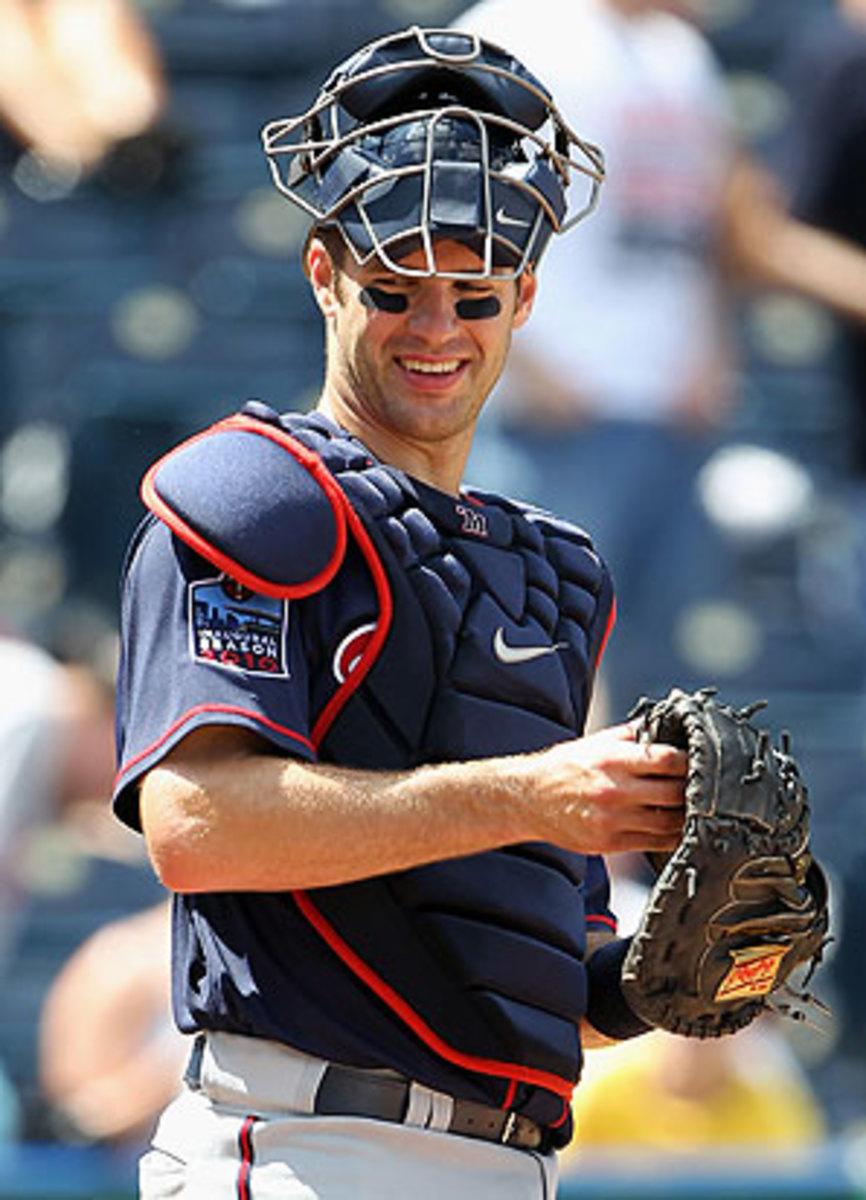Mauer's latest malady begs the question: Is he breaking down?
Now the worst fears for the Twins seem all too close to being real: Is Mauer breaking down?
At age 28, and in the first year of a contract that will pay him $23 million a year through age 35, Mauer was placed on the disabled list Thursday night with "bilateral leg weakness," a condition that may be related to the soreness in his hips, elbow and shoulder he experienced this year, if not the offseason knee surgery that kept him out of most of spring training, if not the inflammation in his back that required him to see a specialist in 2009, the same specialist he will see for the weakness in his legs.
Here is a list of the major physical ailments Mauer has suffered since becoming a big leaguer:
2004: Surgery to repair a torn medial meniscus in left knee.
2007: Stress reaction in left fibula.
2008: Surgery for a minor kidney obstruction.
2009: Inflammation in the sacroiliac joint (back).
2010: Bruised left heel; right shoulder tendinitis; tissue inflammation in left knee; offseason arthroscopic surgery on left knee.
2011: Bilateral leg weakness; soreness in hips, elbow and shoulder.
When Mauer signed his $184 million deal last year, one GM remarked, "That's an awful lot of money for a guy who never has driven in 100 runs or scored 100 runs." Being a catcher, which requires days off and exacts a physical toll, Mauer has missed an average of 43 games per year in his seven major league seasons.
Mauer is one of the best pure hitters in the game, a three-time batting champion. This latest injury may turn out to be nothing major. Perhaps his lack of work in spring training left him ill-prepared to handle the rigors of catching regular season games. (He has caught only nine games so far and hit .235.) Perhaps with rest and physical therapy he can get back to the team soon.
But no matter the prognosis, on the heels of the third significant injury for Mauer in the past 17 months, the Twins at least have to begin to wonder how much longer can they leave their best hitter and $23-million a year investment behind the plate.
Just when I thought Philadelphia righthander Kyle Kendrick had the loneliest job in America -- long man on a staff with five starters who take the ball deep into games -- Cole Hamels and Cliff Lee suffered early knockouts three days apart last week. What happened in Washington the past two nights is more like what you expected from the Phillies: back-to-back complete games by Roy Halladay and Cliff Lee, the first for the Phillies since Paul Byrd and Curt Schilling in 1999.
So I wondered: What rotation was the best at almost never needing a long man? The answer is a tribute to the job pitching coach Don Cooper and manager Ozzie Guillen do in Chicago with the White Sox. Their 2005 and 2006 rotations posted the fewest early knockouts in the live ball era (since 1919).
An early knockout is defined as any start in which the starter is gone after four or fewer innings. The Phillies, already with two such starts, will be hard pressed to replace the world champion 2005 White Sox and their staff of Mark Buehrle, Freddy Garcia, John Garland, Jose Contreras and Orlando Hernandez.
Fewest starts 4 innings or fewer (full seasons since 1919)
By the way, the record for the most early knockouts is 56, set by the 1964 Kansas City A's, a 105-loss team managed by Eddie Lopat and Mel McGaha.
Apparently using steroids is so shameful as to be unspeakable, even when the world knows what happened. Barry Bonds committed a felony, obstruction of justice, rather than answer questions directly about his steroid use, apparently in an effort to save a reputation that long ago was lost. Steroid provider Greg Anderson spent more than a year of his life in prison rather than answer questions about steroids. Manny Ramirez quit baseball without a goodbye or a word of explanation about his second PED bust. Mark McGwire doesn't think steroids helped him hit home runs more frequently than any man in history. Alex Rodriguez never has managed the courage to speak the "S" word, claiming not to know the "banned substance" he was taking for at least three years.
These are strange days indeed. The jurors in the Bonds case couldn't agree on the veracity of the prosecution's witnesses. But they all agreed that Bonds was evasive and couldn't give straight answers to a grand jury about his steroid use. "He was just being Barry," his attorney, Allen Ruby, said, which is to say he considered himself above accountability, even when the home run king talked himself into becoming the home run felon.
For all their brilliance and billable hours, and though Anderson and his doping calendars were taken out of play, giving them a five-run lead before the game even started, Bonds' lawyers were hung with a loss -- the guilty verdict on obstruction.
What they did do is something that could be instructive to the Roger Clemens defense team that followed this trial closely: They tore apart witnesses to the extent that the jury -- thanks chiefly to one holdout among the 12 -- doubted them. This was not good news for Brian McNamee and Andy Pettitte, for instance. If they watched Kimberly Bell essentially put on trial for sloppy mortgage documents and Kathy Hoskins moved to near tears, they got a sense of what it could be like for them under cross-examination come July. The word that comes to mind is "ugly."





